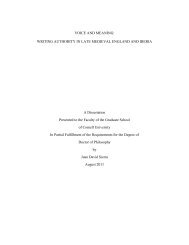Briana Anderson - Cornell University
Briana Anderson - Cornell University
Briana Anderson - Cornell University
Create successful ePaper yourself
Turn your PDF publications into a flip-book with our unique Google optimized e-Paper software.
Limitations<br />
CHAPTER SIX<br />
CONCLUSION<br />
There are several limitations of this study. First, the sample is a relatively<br />
young and female one, where 80% of the sample was female. This has a number of<br />
implications. For one, a young audience may be more trusting of a cosmetics<br />
company than a pharmaceutical company due to their age, i.e. college students,<br />
especially females, will have more experience and knowledge of cosmetics companies<br />
than pharmaceutical companies. This could possibly account for why, overall, the<br />
cosmetics company received higher ratings of organizational credibility. Additionally,<br />
the sample is heavily female, which skews results to a more female point of view.<br />
Females might more readily trust cosmetics companies, are more likely concerned<br />
with or personally involved with breast cancer research, and may make judgments<br />
about a woman’s physical appearance differently than males. Thus, this may affect<br />
the external validity of the study. Future studies could fix this problem by obtaining a<br />
more representative sample.<br />
Second, this study only examines pharmaceutical and cosmetics companies.<br />
There are many different types of companies that engage in public relations, reputation<br />
management and social responsibility activities. Additionally, the companies used in<br />
the study are fictitious companies; it may be unrealistic or artificial to have no feelings<br />
toward a company. However, for the sake of this study, it was beneficial that subjects<br />
not have preconceived notions of the companies in the study since the study was more<br />
concerned with the relationship of endorser to the organization (based on endorser<br />
attractiveness and company type not an existing attitude toward company reputation).<br />
Again, this may affect the external validity of the study in that only two types of<br />
companies were examined and the results may not be generalizable to other industries.<br />
65

















